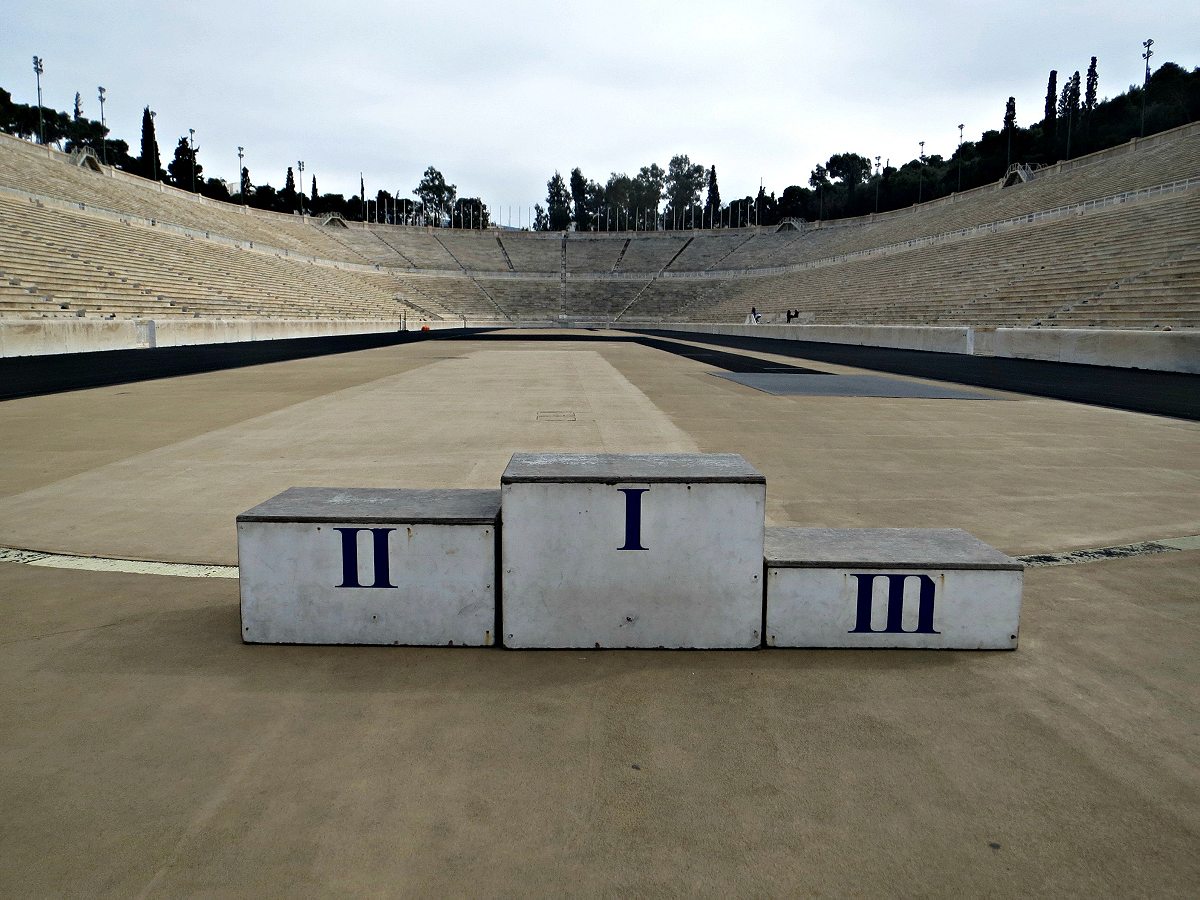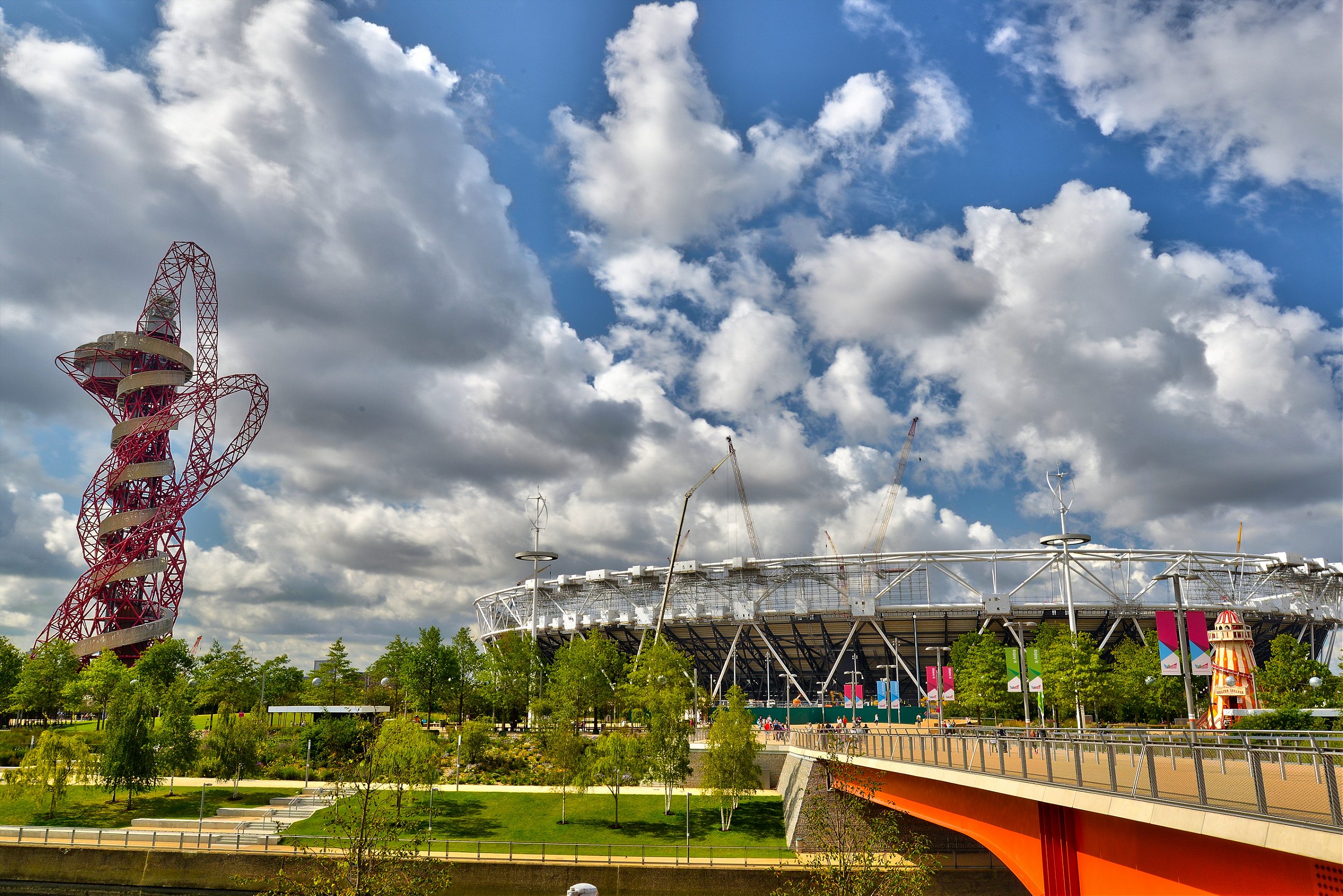They come, they go, they leave ruin in their wake. Why would anyone want to host the Games?
There are two great piles of ruin in Athens. The first, the best-known, is the Acropolis, a citadel perched on a tight rock in the ancient center of the city, a temple complex ordered built by Pericles in the 400s BCE, and which seems to still be under construction. The hill buzzes with frantic life, tourists zipping about between entertainers in 300 costumes. Every building is swathed in scaffolding, jutting cranes poke their heads between the columns, piles of blocks litter the pediments ready to be assembled again. It doesn’t look like a ruin being renovated; it looks like something that has been held up by strikes and funding setbacks, but which is, after twenty-five centuries, finally nearing completion, for a public that wants a Temple of Zeus no less now than it did then.
The other great ruin in Athens is the site of the 2004 Olympic Games. It couldn’t be more different. The whole site is full of a numinous silence, a respectful ossuary hush for the dead. Blocked off from the surrounding neighborhood of Marousi by train lines, highways, and fences, the place seemed chilly when I visited, even despite the dripping summer heat. Its strange architectural scribbles twisting lonely across vast tracts of withered scrub, dense patterns blistering under the skin of plastic signs, ghostly harmonies twanging out as the expressive steel arches bent in the wind. There were few signs of life: under the shade of Eirini metro station a small café serves sandwiches and bottled drinks, and in a bright red car near the stadium a security guard sat eating a large slice of pizza. Even these felt like trespassers, and so did I. Far more than the Acropolis, the twelve-year-old Olympic park seems ancient in its desolation, like the forbidden site of some divine retribution.

This is what the Olympics do: they descend on a city from nowhere and everywhere all at once, and leave nothing but hollowness in their wake. They swoop across the world searching for cities to eat. Today in Rio, there’s a scavenger’s frenzy, a planet’s worth of flashing cameras ready to capture a mass display of human vitality. Six weeks from now, what will be left?
In London, where I’m writing, our Olympic park has seemingly fared a little better. It’s also ringed by fences and prowled by private security companies, but the grass is still trimmed and watered, and you can even see people wandering past the huge stadium we still don’t really know what to do with. But that goes for most of the park: we have it now, long after forgetting the Games, and so the authorities are forced into increasingly desperate attempts to find a use for the thing. Attempts have been made. On one grim drizzling ash-grey day I saw a ten-piece band playing frantic swing jazz from an inflatable stage, for an audience of three security guards and two audience members huddled under a marquee. As the rain came down in callous flecks, only a strange haunted look from one of the players, quickly repressed, betrayed the fact that these people had found themselves trapped in a vicious logic they couldn’t quite understand.
The 2012 Olympics were held in Stratford, in the east of the city, one of the slow, shabby, run-down working-class areas that Britain excels at producing. A place that seemed, like so many other tracts of concrete and piss-sodden underpasses and pubs with fraying carpets, to be suffocating in a perpetual sepia-toned fug. In other words, a place where people lived. The Olympics were supposed to regenerate the area, which they did: instead of tolerable dilapidation, the destruction is now total. Thousands were forced from their homes to build this park, many thousands more have been forced to leave since by the sudden bloom in house prices. Where they’d once lived, there are the luxury apartments of the former athletes’ village, pristine and soundless and blank, many of them empty, with plumy Dickensian names—Chobham Manor, Pudding Mill, Sweetwater, Marshgate Wharf—as a final insult, to mark the thing that they’ve destroyed and replaced with Anywhere, Planet Earth.

And so it goes. The 2008 Games in Beijing were successful. The park there is like London’s: ordered, clean, expensive, full of tourists but still lifeless. A ruin. The 2014 Winter Olympics in Sochi were not. The park there is more like the one in Athens: the mud seeping in to this winter sports park in a seaside resort, the infrastructure already falling apart, the new developments lifeless, a ruin.
Cities spend vast amounts of money on the Olympics—$10 billion in London, $50 billion in Sochi, much of it paid out to private contractors of mafia operations, depending on which name is in local use. Even more is paid in backhand deals with the IOC for the privilege. Reports show that the Summer Olympics generate just north of $5 billion, and half of that goes back to the International Olympic Committee (one of the world’s most corrupt organizations—but that’s another story entirely). In the short term, it’s a disastrous return on the investment.
The justification is that the Games are a spur for redevelopment, as if these places couldn’t carry out building projects anyway, without the crutch of a few chemically-enhanced pole vaulters or some televised equestrian dressage. The spikes in tourism the Olympics provide rarely translate into a long-term trend— Barcelona might have done well, but in Vancouver tourism actually dropped after the 2010 Games. Almost nowhere has the competition actually lived up to its promise. Much of the world is finally catching on: the Olympics once reliably drew a dozen or more bids from potential hosts; for the 2020 Summer Olympics, just five cities applied.
For this year’s Olympics in Rio de Janeiro, entire neighborhoods have been razed to make way for the site of the Games, and the promised legacy-building upgrades to the city’s famous favelas have done little for the people who live in them, but much for more prosperous classes who might want to move in. According to a report by the Instituto de Segurança Pública, police killings in Rio have spiked by 135 percent, as cops with military weapons stalk through slums at night to make sure the world can enjoy its summer of sport without interruption. Whether it will be successful, whether Rio gets one form of ruin or the other, remains to be seen.
There’s a popular misconception that during the original Olympics in ancient Greece, a truce was observed: city-states at war would stop throwing javelins at each other and start lobbing them at straw targets instead. It’s not true, but that hardly matters; the fact that it’s believed is more significant. Sport is a kind of substitute or symbolic war—the first Olympic Games were held by the hero Pelops, a mimetic chariot race to commemorate a real and lethal one in which he killed his father-in-law, a way to compensate for his crime—but the two, image and reality, shouldn’t actually coincide. This is why it seems weird when war and the Olympics do happen together: Russians and Georgians playing beach volleyball in Beijing while their armed forces tried to kill each other in Ossetia; civil conflict erupting in Ukraine while the national team competed in Sochi; the sense of an actor suddenly breaking character.
Each event is as much an arms fair as a sporting competition
But any difference is melting away. Each event is as much an arms fair as a sporting competition: all the cameras and all the high-profile targets are a huge, inviting lure for terrorism, and the state’s gamble is that they’ll be able to foil any attempt before it happens. London saturated its site with biometric security cameras, mobilized the army to run security checks when G4S couldn’t fulfil its contract, put an aircraft carrier on the Thames, and anti-aircraft batteries on the rooftops of surrounding buildings—and when they scared off any aerial assault on Stratford, the same system was bought for undisclosed millions by the militaries of Thailand and Malaysia. The Olympic Games don’t do much concrete good for ordinary people, but like most armed engagements, it’s not really for their benefit.
Between war and the Olympics the result is often indistinguishable. Cities left hollowed-out and uninhabitable, soldiers on every corner—but at the same time a renewed sense of national pride, smiling faces poking up through the rubble, a sudden and ephemeral unity. Twelve months before the 2012 Games, rioting broke out across England. The cause—the police murder of a young black man—was tragic, and so were the consequences; afterwards, five more people had been killed.
But in so many reports and interviews the rioters spoke of a sudden sense of freedom as the police lines melted away, a sense that the city they lived in was finally theirs. This new freedom was ruthlessly cracked down on by the police and the courts, and in its place we had the Olympics: London came together, but it was a prosthetic communal ownership of a city becoming ever more privatized.
In Brazil, a legislative coup has brought in the country’s most regressive government in decades; a cabinet staffed entirely by white men, brutal austerity measures, suggestions that years of environmental protections are about to be suddenly rolled back. Once, governments unsure of their legitimacy would compensate by invading their neighbors. Now they just throw the biggest party in the world. But after the survivors take their medals and the media have lost interest, what’s left is the same:, the harsh sun and the crickets, and a pile of ruin.
Top image: Barra Olympic Park in Rio de Janeiro. Photo by: Miriam Jeske